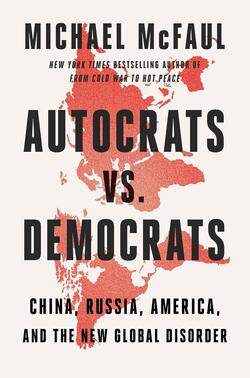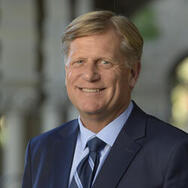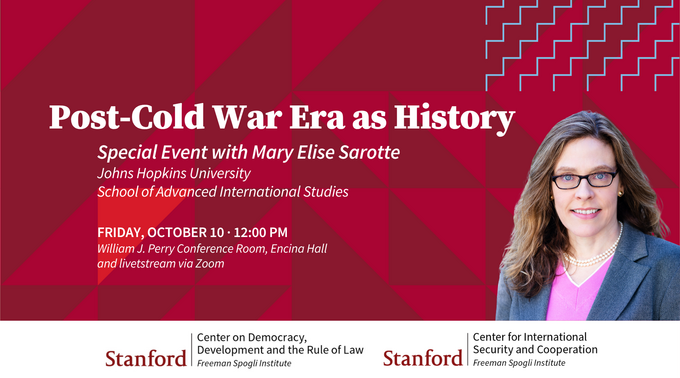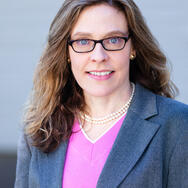Drell Lecture 2025: The Future of Nuclear Deterrence
Media: please reach out to cisacevents@stanford.edu
About the Event
Jill Hruby will be this year's Drell Lecturer presenting on, "The Future of Nuclear Deterrence". The Drell Lecture is an annual public event sponsored by CISAC. By tradition, the Drell lecturer addresses a current and critical national or international security issue that has important scientific or technical dimensions.
About the Speaker
Jill Hruby served as the Under Secretary for Nuclear Security at the Department of Energy and Administrator of the National Nuclear Security Administration from July 2021 to January 2025. Since early 2025, Jill has joined the Lawrence Livermore Board, the Anthropic National Security and Public Sector Advisory Committee, the Science and Security Advisory Board for the Bulletin of Atomic Scientists, and will join the Atomic Weapons Establishment Board in January 2026.
Prior to being a political appointee, Hruby had a 34-year career at Sandia National Laboratories retiring in 2017 as the Laboratories Director. At Sandia, Hruby held roles of increasing responsibilities in nuclear weapons systems and component design, nuclear non-proliferation, defense and homeland security technologies and systems, renewable energy, materials science, engineering sciences, and microsystems technology.
After retiring from Sandia, Hruby served as the inaugural Sam Nunn Distinguished Fellow at the Nuclear Threat Initiative from 2018-2019 and continued as a nonresident Distinguished Fellow until her appointment. In addition, she was a member of the Defense Science Board and the National Academy Committee for International Security and Arms Control. Hruby earned her bachelor’s degree from Purdue University and her master’s degree from the University of California at Berkeley, both in mechanical engineering. She has received honorary doctorate degrees from Purdue University and Michigan State University. In 2022, she was elected to the National Academy of Engineering. Jill has received the Department of Energy Secretary’s Exceptional Service Award, the National Nuclear Security Administrator’s Distinguished Service Gold Award, and Office of the Secretary of Defense Medal for Exceptional Public Service.
Please join us for refreshments in Oksenberg Hall following the conclusion of the lecture from 5:00 - 6:00 PM. All CISAC events are scheduled using the Pacific Time Zone.
Book Talk with Michael McFaul | Autocrats vs. Democrats: China, Russia, America, and the New Global Disorder
This event is expected to be at full capacity. Seating is available on a first-come basis.
Join us for a book talk and signing with Professor Michael McFaul, director of the Freeman Spogli Institute for International Studies, New York Times bestselling author, and former U.S. ambassador to Russia.
Autocrats vs. Democrats: China, Russia, America, and the New Global Disorder is a clear-eyed look at how the rise of autocratic China and Russia are compelling some to think that we have entered a new Cold War—and why we must reject that thinking in order to prevail.

Amid the constant party divisions in Washington, DC, one issue generates stunning consensus—China—with Republicans and Democrats alike battling over which party can take the most hawkish stance toward the ascendant superpower. Indeed, far from trying to avoid a new Cold War with China, many have embraced it, finding comfort in the familiar construct, almost willing it into existence. And yet, even as politicians and intellectuals race to embrace this Cold War 2.0, many of the perils we face today are distinctly different from those of the Cold War with the Soviets. The alliance between the autocracies of China and Russia, the nature of the ideological struggle, China’s economic might, the rise of the far right in the United States and in Europe, and the growing isolationism and polarization in American society—taken together these represent new challenges for the democratic world. Some elements of the Cold War have reappeared today, but many features of the current great power competition have no analogy from the past century.
For decades Michael McFaul, former ambassador to Russia and international affairs analyst for NBC News, has been one of the preeminent thinkers about American foreign policy. Now, in this provocative work, he challenges the encroaching orthodoxy on Russia and China, arguing persuasively that the way forward is not to force our current conflict into a decades-old paradigm but to learn from our Cold War past so that democracy can again emerge victorious. Examining America’s layered, modern history with both Russia and China, he demonstrates that, instead of simplistically framing our competition with China and Russia as a second Cold War, we must understand the unique military, economic, and ideological challenges that come from China and Russia today, and the develop innovative policies that follow from that analysis, not just a return to the Cold War playbook.
At once a clarion call for American foreign policy and a forceful rebuttal of the creeping Washington consensus around China, Autocrats vs. Democrats demonstrates that the key to prevailing in this new era isn’t simply defeating our enemies through might, but using their oppressive regimes against them—to remind the world of the power and potential that our democratic freedoms make possible.

Professor Michael McFaul
Hauck Auditorium, Traitel Building, 435 Lasuen Mall, Stanford, CA 94305
Michael A. McFaul
Encina Hall
616 Jane Stanford Way
Stanford, CA 94305-6055
Michael McFaul is the Ken Olivier and Angela Nomellini Professor of International Studies in Political Science, Senior Fellow at the Freeman Spogli Institute for International Studies, and the Peter and Helen Bing Senior Fellow at the Hoover Institution, all at Stanford University. He joined the Stanford faculty in 1995 and served as FSI Director from 2015 to 2025. He is also an international affairs analyst for MSNOW.
McFaul served for five years in the Obama administration, first as Special Assistant to the President and Senior Director for Russian and Eurasian Affairs at the National Security Council at the White House (2009-2012), and then as U.S. Ambassador to the Russian Federation (2012-2014).
McFaul has authored ten books and edited several others, including, most recently, Autocrats vs. Democrats: China, Russia, America, and the New Global Disorder, as well as From Cold War to Hot Peace: An American Ambassador in Putin’s Russia, (a New York Times bestseller) Advancing Democracy Abroad: Why We Should, How We Can; and Russia’s Unfinished Revolution: Political Change from Gorbachev to Putin.
He is a recipient of numerous awards, including an honorary PhD from Montana State University; the Order for Merits to Lithuania from President Gitanas Nausea of Lithuania; Order of Merit of Third Degree from President Volodymyr Zelenskyy of Ukraine, and the Dean’s Award for Distinguished Teaching at Stanford University. In 2015, he was the Distinguished Mingde Faculty Fellow at the Stanford Center at Peking University.
McFaul was born and raised in Montana. He received his B.A. in International Relations and Slavic Languages and his M.A. in Soviet and East European Studies from Stanford University in 1986. As a Rhodes Scholar, he completed his D. Phil. in International Relations at Oxford University in 1991.
International Working Group on Russian Sanctions
Global Populisms
Mary Elise Sarotte — Post-Cold War Era as History

Professor Mary Elise Sarotte, award-winning historian and author of Not One Inch: America, Russia, and the Making of Post-Cold War Stalemate, will offer reflections on the difficult task of writing history that is still unfolding. Covering the pivotal years from 1989 to 2022, her work traces how early decisions at the end of the Cold War shaped the trajectory of U.S.–Russia relations and contributed to the impasse that continues to trouble the international order today. In this conversation, Sarotte will explore the historian’s challenge of disentangling myth from evidence, of balancing archival distance with contemporary resonance, and of reckoning with a legacy that remains deeply contested and urgently relevant.
The event will begin with opening remarks from Kathryn Stoner, Mosbacher Director of the Center on Democracy, Development, and the Rule of Law (CDDRL). The event will conclude with an audience Q&A.
This event is co-sponsored by the Center on Democracy, Development and the Rule of Law (CDDRL), and the Center for International Security and Cooperation (CISAC).
speakers

Mary Elise Sarotte
Mary Elise Sarotte received her AB in History and Science from Harvard and her PhD in History from Yale. She is an expert on the history of international relations, particularly European and US foreign policy, transatlantic relations, and Western relations with Russia. Her book, Not One Inch: America, Russia, and the Making of Post-Cold War Stalemate, was shortlisted for both the Cundill Prize and the Duke of Wellington Medal, received the Council on Foreign Relations Arthur Ross Prize Silver Medal, and won the Pushkin House Prize for Best Non-Fiction Book on Russia. Not One Inch is now appearing in multiple Asian and European languages, including a best-selling and updated version in German, Nicht einen Schritt weiter nach Osten. In 2026, Sarotte will return to Yale for a joint appointment as a tenured professor in both the Jackson School of Global Affairs and the School of Organization and Management.

Kathryn Stoner
Kathryn Stoner is the Mosbacher Director of the Center on Democracy, Development and the Rule of Law (CDDRL), and a Senior Fellow at CDDRL and the Center on International Security and Cooperation at FSI. From 2017 to 2021, she served as FSI's Deputy Director. She is Professor of Political Science (by courtesy) at Stanford, and she teaches in the Department of Political Science, in the Program on International Relations, as well as in the Ford Dorsey Master's in International Policy Program. She is also a Senior Fellow (by courtesy) at the Hoover Institution.
William J. Perry Conference Room, 2nd Floor
Encina Hall (616 Jane Stanford Way, Stanford)
This is a hybrid event. For virtual participation, if prompted for a password, use: 123456
War on the Current Global Landscape
Sir. Lawrence Freedman is also delivering the Annual Alexander Dallin Lecture "Escalations, Red Lines, Risks, and the Russo-Ukrainian War" on Thursday, April 18, 2024 at 5:30pm PT at the Humanities Center, Levinthal Hall.
Encina Commons 123
Can Nuclear Power Save Us From Climate Change? | Allison Macfarlane
This event is open only to Stanford faculty, staff, fellows, and students.
Bio:
Allison Macfarlane is Professor and Director, School of Public Policy and Global Affairs, Faculty of Arts, the University of British Columbia. Dr. Macfarlane has held both academic and government positions in the field of energy and environmental policy, especially nuclear policy. The first geologist (and the third woman) to chair the U.S. Nuclear Regulatory Commission from 2012-2014, Dr. Macfarlane holds a doctorate in earth science from MIT and a bachelor's of science from the University of Rochester. She has held fellowships at Radcliffe College, MIT, Stanford, and Harvard Universities, and she has been on the faculty at Georgia Tech in Earth Science and International Affairs, at George Mason University in Environmental Science and Policy, and in the Elliott School of International Affairs at George Washington University. From 2010 to 2012 Dr. Macfarlane served on the White House Blue Ribbon Commission on America's Nuclear Future. Dr. Macfarlane’s research has focused on technical, social, and policy aspects of nuclear energy production and nuclear waste management and disposal as well as regulation, nuclear nonproliferation, and energy policy.
Abstract:
New nuclear reactors, including small modular reactors (SMRs) and advanced reactors, have been touted in the media recently as the best way to transition off fossil fuels. Reactor proponents claim that they will be cheaper, safer, and produce less waste than existing large light water reactors. But are these claims realistic? This talk will examine the challenges facing these new nuclear technologies and will attempt to address whether new nuclear power will help us move quickly to a low-carbon future.
All CISAC events are scheduled using the Pacific Time Zone.
William J. Perry Conference Room
Siege Starvation: A War Crime of Societal Torture | Tom Dannenbaum
This event is open only to Stanford faculty, staff, fellows, and students.
Bio:
Tom Dannenbaum is Associate Professor of International Law at the Fletcher School of Law & Diplomacy, where he is Co-Director of the Center for International Law & Governance. Prior to joining the Fletcher School, he taught at University College London and Yale Law School. Dannenbaum writes on the law of armed conflict, the law governing the use of force, international criminal law, human rights, shared responsibility, and international judging. His articles have appeared in a range of leading journals and have received multiple awards, including the American Society of International Law’s (ASIL) International Legal Theory Scholarship Prize in 2022 for his work on siege starvation and ASIL’s Lieber Prize in 2017 for his work on the crime of aggression. His writing on peacekeeping has been cited by the Hague Court of Appeal and the International Law Commission. His book, The Crime of Aggression, Humanity, and the Soldier, was published by Cambridge University Press in 2018. Dannenbaum has testified or presented before U.S. congressional and U.N. bodies and has appeared or been quoted in leading media outlets, including the New York Times, the Economist, National Public Radio, PBS Frontline, the BBC World Service, MSNBC, Deutsche Welle, and Süddeutsche Zeitung, among others. He has received teaching awards at both the Fletcher School and UCL, as well as the faculty research award at Fletcher. He holds a PhD from Princeton, a JD from Yale, and a BA from Stanford.
Abstract:
A recent amendment to the Rome Statute of the International Criminal Court has drawn unprecedented attention to the war crime of starvation of civilians as a method of warfare. It comes at a time when mass starvation in war is resurgent, devastating populations in Ethiopia, Nigeria, Palestine, South Sudan, Sudan, Syria, Ukraine, Yemen, and elsewhere. The practice has also drawn the scrutiny of the United Nations Security Council. And yet, what precisely is criminally wrongful about starvation methods remains underspecified.
A common way of thinking about the criminal wrong is as a form of killing or harming civilians. Although its differentiating particularities matter, the basic wrongfulness of the crime inheres, on this view, in it being an attack on those who ought not be attacked. For some, this supports a broad interpretation of the starvation ban. However, for others, the graduality of starvation preserves the continuous possibility of the avoidance or minimization of civilian death or harm in a way that direct kinetic attacks do not. In combination with the method’s purported military utility, this distinctive incrementalism has underpinned arguments for the permissibility of certain forms of siege and other deprivation and a narrow interpretation of the starvation crime.
Drawing on the moral philosophy of torture, this Article offers a different normative theory of the crime. Starvation, like torture, is peculiarly wrongful in its distortion of victims’ biological imperatives against their capacities to formulate and act on higher-order desires, political commitments, and even love. This process does not merely raise the cost of fulfilling those commitments. Instead, starvation tears gradually at the very capacity of those affected to prioritize their most fundamental commitments, regardless of whether they would choose to do so under the conditions necessary to evaluate matters with a “contemplative attitude.” Rather than palliating, the slowness of starvation methods is at the crux of this torturous wrong. Recognizing this redefines the meaning and place of the crime in the framework of international criminal law.
All CISAC events are scheduled using the Pacific Time Zone.
William J. Perry Conference Room
Toward a Reasonable Middle Ground in the Oversight of Enhanced Potential Pandemic Pathogen Research | Marc Lipsitch
This event is open only to Stanford faculty, staff, fellows, and students.
Bio:
Marc Lipsitch is Professor of Epidemiology at the Harvard T. H. Chan School of Public Health. He directs the Center for Communicable Disease Dynamics and the Interdisciplinary Program on Infectious Disease Epidemiology. He is an honorary faculty member at the Wellcome Sanger Institute. He is currently on part-time secondment to the US CDC as Senior Advisor for the Center for Forecasting and Outbreak Analytics, for which he was the founding co-director (though this talk is in his personal and academic capacity). His scientific research concerns the effect of naturally acquired host immunity, vaccine-induced immunity, and other public health interventions on the population biology of pathogens and the consequences for human health. In the area of biosafety and biosecurity, he co-founded the Cambridge Working Group, whose efforts led to the US government funding pause on gain-of-function research to enhance potential pandemic pathogens, and he has been writing and speaking on policy issues in this area in both popular and peer-reviewed forums for over a decade. He has authored 400 peer-reviewed publications on antimicrobial resistance, epidemiologic methods, mathematical modeling of infectious disease transmission, pathogen population genomics, research ethics, biosafety/security, and immunoepidemiology of Streptococcus pneumoniae. Dr. Lipsitch is a leader in research and scientific communication on COVID-19. Dr. Lipsitch received his BA in philosophy from Yale and his DPhil in zoology from Oxford. He did postdoctoral work at Emory University and CDC. He is a member of the American Academy of Microbiology and the National Academy of Medicine.
Abstract:
The growing ability of researchers to enhance potential pandemic pathogens' transmissibility or virulence has raised concerns about the risk that such research could lead to a pandemic through accidental or inadvertent release, or that the products of the research, including the knowledge it creates, could facilitate deliberate acts of bioterrorism. An incipient policy process to address these concerns in the mid-late 2010s was interrupted by the COVID-19 pandemic, and attention has recently returned to the topic especially in the US but also internationally. While the White House has been constructing guidance (not released as of this writing in January 2024), the scientific and wider community have reached a state of polarization, with many calling for an outright ban, and others claiming that scientific self-regulation is sufficient. This talk will describe the components of a middle way that acknowledges a legitimate public interest in restricting experiments that could heighten pandemic risks, in the absence of compelling and offsetting public health benefits. It will begin with a historical overview of the issue, consider informative and misleading parallels to the notion of restricting research with pandemic risks, and suggest ways forward to break this deadlock.
All CISAC events are scheduled using the Pacific Time Zone.
William J. Perry Conference Room
Recoding America: Book Talk With Jennifer Pahlka
Event Details:
Join us for an engaging conversation with Jennifer Pahlka (Code for America), Ingrid Pappel (Tallinn University of Technology), and Andrew Grotto (Stanford University) on
Recoding America: Why Government is Failing in the Digital Age and How We Can Do Better
Just when we most need our government to work – to decarbonize our infrastructure and economy, to help the vulnerable through a pandemic, to defend ourselves against global threats – it is faltering. Government at all levels has limped into the digital age, offering online services that can feel even more cumbersome than the paperwork that preceded them and widening the gap between the policy outcomes we intend and what we get.
But it’s not more money or more tech we need. Government is hamstrung by a rigid, industrial-era culture, in which elites dictate policy from on high, disconnected from and too often disdainful of the details of implementation. Lofty goals morph unrecognizably as they cascade through a complex hierarchy. But there is an approach taking hold that keeps pace with today’s world and reclaims government for the people it is supposed to serve. Jennifer Pahlka shows why we must stop trying to move the government we have today onto new technology and instead consider what it would mean to truly recode American government.
SPEAKER: Jennifer Pahlka is the author of Recoding America: Why Government is Failing in the Digital Age and How We Can Do Better. She founded Code for America in 2010 and led the organization for ten years. In 2013, she took a leave of absence to serve as U.S. Deputy Chief Technology Officer under President Obama and helped found the United States Digital Service. She served on the Defense Innovation Board under Presidents Obama and Trump. At the start of the pandemic, she also co-founded United States Digital Response, which helps government meet the needs of the public with volunteer tech support. She received the Skoll Award for Social Entrepreneurship, and was named by Wired as one of the 25 people who has most shaped the past 25 years. Jennifer is a graduate of Yale University.
DISCUSSANT: Ingrid Pappel is the 2023 Global Digital Governance Fellow at Stanford University, Associate Professor at the Department of Software Science and Vice-Dean for Master's studies at the School of IT, Tallinn University of Technology. She has more than 20 years of experience in different development projects related to e-governance solutions in Estonia and abroad. She is the head of the Digi-State Technologies and Architecture research group, which addresses the complexity related to how governments can satisfy the demands of their citizens in times of need. Her research focuses on digital government ecosystems by investigating technologies that support digital transformation. Her research topics are related to the development activities in launching paperless management by creating interoperability with state registries and external and internal systems.
MODERATOR: Andrew J. Grotto is a William J. Perry International Security Fellow at the Center for International Security and Cooperation (CISAC) and a Research Fellow at the Hoover Institution, both at Stanford University. He is also Director of the Program on Geopolitics, Technology, and Governance (FSI). Grotto’s research interests center on the national security and international economic dimensions of America’s global leadership in information technology innovation, and its growing reliance on this innovation for its economic and social life.
The event is free and open to the public. RSVP is requested.
This event is part of Global Conversations, a series of talks, lectures, and seminars hosted by Stanford University Libraries and Vabamu with the goal of educating scholars, students, leaders, and the public on the benefits of but also challenges related to sustaining freedom.
Hohbach Hall, Room 122
557 Escondido Mall, Stanford, CA 94305
Rethinking Modern Sunni-Shii Relations: The State, Revolution, and Foreign Intervention

What explains the turn towards more politically relevant Sunni and Shii identities in the modern period? How do we account for a shift from Sunni-Shii cooperation against colonialism, for example, or in defense of the Ottoman Caliphate, towards polarisation? This lecture will look especially at the role of the modern state in regulating religion more broadly, coopting certain cultural groups and alienating others, and fostering sharpened sectarian identities. It will also look at the impact of the 1979 revolution in Iran, and reactions towards it, and of foreign intervention, especially the Iraq war of 2003 in sectarianizing the Middle Eastern regional system.
This event is sponsored by the Abbasi Program in Islamic Studies in partnership with the Center for International Security and Cooperation (CISAC) and the Program on Arab Reform and Democracy at CDDRL.
ABOUT THE SPEAKER

Toby's aim in research and teaching is to study the Middle East in a global context. His research is characterized by the use of primary sources, archives, fieldwork, and engagement with social science and historiographical debates. He is the author of Sectarian Gulf: Bahrain, Saudi Arabia, and the Arab Spring That Wasn’t (Stanford University Press, 2013), a book on the impact of the Arab Spring on the Gulf States. His second book, The Other Saudis: Shiism, Dissent and Sectarianism (Cambridge University Press, 2015) dealt with the relationship between the Shii community in the Eastern Province and the Saudi state, and with transnational movements and Iran. It is based on fieldwork in Saudi Arabia and the wider region, and hitherto unused Arabic archives.
His forthcoming book, The Caliph and the Imam: The Making of Sunnism and Shiism, is a global history of Sunni-Shii relations and is published by Oxford University Press. Toby's work has also been translated into Arabic and Persian and apart from English, he publishes in German. His other research interests relate to the history of Leftist movements and the use of Islam as anti-Communism during the Cold War.
Encina Commons 123 or online via Zoom
